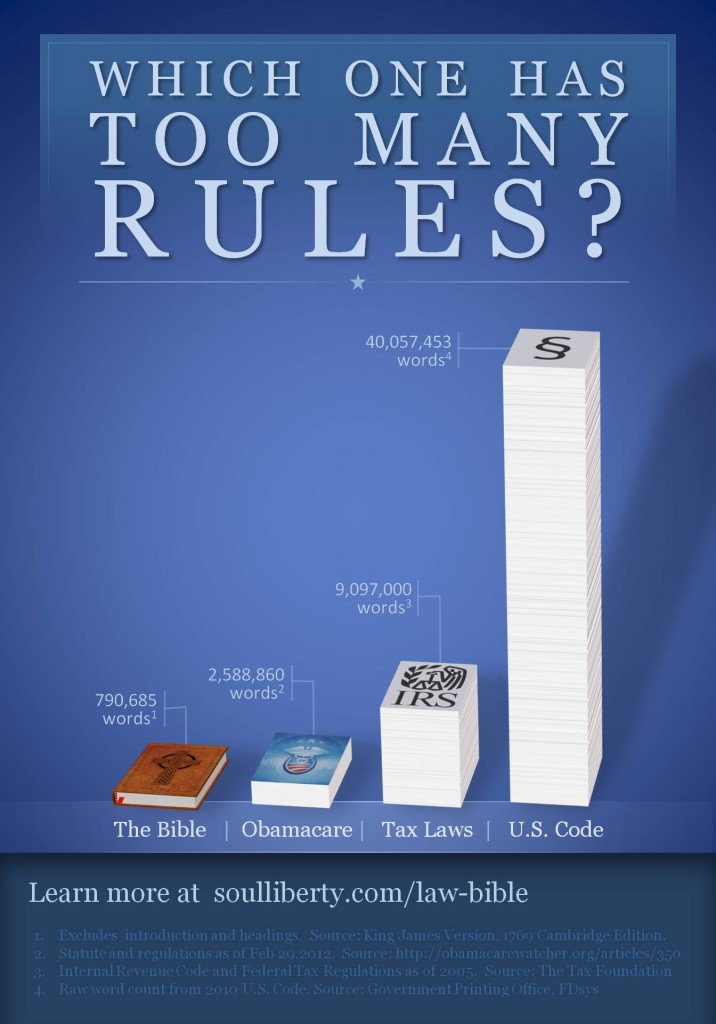Christianity is too judgmental, too strict. We must drop such dogma if we are to live as free people in a just society. You have heard this said before. You may have thought it yourself. This impression is false and easily disproved by a simple comparison of the words in the Bible vs. the collection of documents that define United States law.
Suddenly the Bible does not seem to be such an oppressive rule book after all, especially when considering this chart does not account for many federal regulations, state laws, city ordinances, etc. Some point to the dietary laws penned by Moses as an example of invasive restrictions on personal freedom. This seems to be a reasonable argument until you look at Title 21 of the U.S. Code which governs food and drugs. It has 699,440 words. Moses only managed to write 174,733 words in the Bible during his entire 120 years on Earth! The FDA certainly has a lot more “thou shalt nots” limiting dietary freedom than God ever passed down to the Jews.
The same holds true for many other aspects of our lives from the time we brush our teeth to driving to and from work to watching TV at night. All of these activities are regulated, monitored, and controlled to one degree or another by one or more federal agencies somewhere along the line.
The Source and Justification for Laws
Before going further, we would be wise to understand the reasons that we write laws to begin with. Consider the words of Frederick Bastiat in his masterful book, The Law:
Life, liberty, and property do not exist because men have made laws. On the contrary, it was the fact that life, liberty, and property existed beforehand that caused men to make laws in the first place…Each of us has a natural right – from God – to defend his person, his liberty, and his property.
[amazon asin=1440446458&template=iframe image] Those things which we have a natural right to defend are those which originate from our Creator. Therefore, the words God has spoken to us in the Bible should be the foundation of our laws which protect those gifts. Then, how do we end up with so many statutes which extend far beyond this intent? Paul writes in 1 Timothy 1:8, “But we know that the law is good, if a man use it lawfully.” When we step away from the biblical basis of natural law, we begin to use it improperly. The law fails when we turn its intent toward what Bastiat describes as “stupid greed and false philanthropy.”
We have attempted to force “false philanthropy” upon our society through legal plunder – the use of force to deny a person’s right to their property. As evidence, the longest section of the U.S. Code is the one dealing with health and welfare. It is over 8 million words which makes it longer than the entire tax code and associated regulations combined. Surely it is noble to take care of the needy and sickly, but it is unjust to forcibly confiscate someone else’s money to do so. Religion accomplishes the same task through genuine charity which is not given out of duty, obligation, or force (2 Cor 9:7). In this and many other ways, the Christian worldview is the antidote (not the source) of injustice or oppression.
Legalism and Grace
When preachers step forward to explain these principles and call us to adhere to God’s standards, some will object that it’s too legalistic. But, the same folks will not cry “legalism!” when the IRS comes to enforce tax laws which are three and a half times the size of scripture. It might be easy to jest at this hypocrisy, but it raises a useful point. Is it reasonable to expect anyone to fully comply with a set of laws so voluminous we can’t even manage to read them let alone understand and follow them to the letter? Certainly not, and here the faithful critic of legalism is correct to point out our utter inability to live a sinless life (Rom 3:12).
If we fail to follow every rule and regulation codified in U.S. law, we may experience little or no consequence. Even if we are to commit the most heinous of crimes, our sentence may only be the death of our earthly bodies. In contrast, God administers eternal and infinitely more severe consequences for breaking just one of his commandments. This may be one reason that biblical guidelines are seen as less forgiving than federal laws.
While more and more people are beginning to fear our government, our deeper fear is of the one who can destroy both our body and soul in Hell (Matt 10:28). The natural desire is to ignore or deny this existence of Hell, hoping it will squash our fear. Why would God set up such severe punishment? Does he hate us? No. God so loved the world that he gave his only begotten son (John 3:16) to pay the debt we owe so we won’t have to suffer this awful fate.
This is how a righteous judge can also offer us the kind of liberty and peace that can be found nowhere else but in the salvation of Jesus Christ. When we approach God in repentance and ask forgiveness, it is freely granted. Ask the same of Homeland Security when you forget to leave a pocket knife in the car at the airport and you’ll find out just how “forgiving” our government can be.
It is time to recognize that when we look to God’s instructions we can be free; when we pile regulations on top of laws built on the wrong foundation, we are crushed under the weight of government power. If we are to find freedom, let us heed the words in Galatians 5:1:
Stand fast therefore in the liberty wherewith Christ hath made us free, and be not entangled again with the yoke of bondage.

